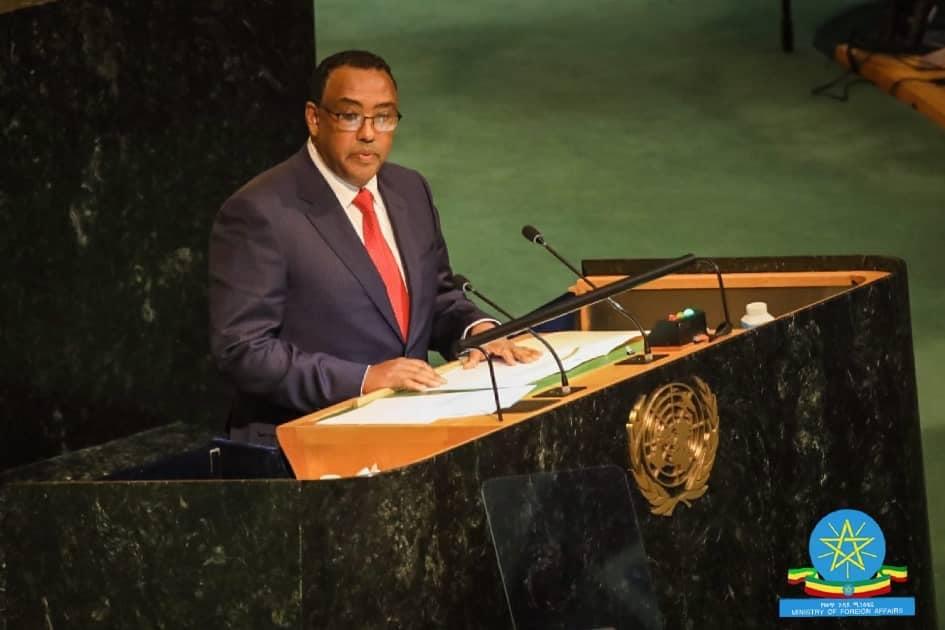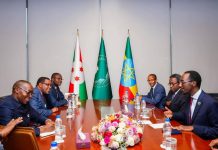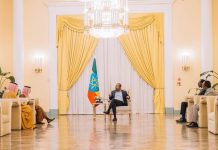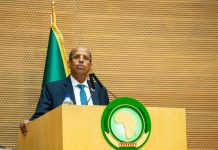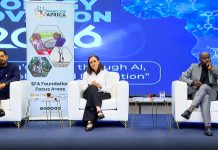Africa-Press – Ethiopia. The criminal group, TPLF, remains hell-bent on destroying the social foundation of Ethiopia, Deputy Prime Minister & Foreign Minister Demeke Mekonen said at UNGA77.
At the General Debate of the 77th Session of the United Nations General Assembly, Deputy Prime Minister & Foreign Minister Demeke Mekonen said that the terrorist TPLF group still remains hell-bent on destabilizing the social foundations colluding with external actors opposing the development aspirations of the country.
Yet, the Government of Ethiopia has earnestly tried to avoid this conflict; and regrettably, the efforts to prevent the conflict from igniting were not successful, he added.
However, thanks to the resolve and determination of Ethiopia, the designs of our adversaries against our progress have been frustrated, he underscored.
“We have also paved a path for peace and recovery relying on the ability of the peace-loving people of Ethiopia to reconcile, make peace among ourselves and start the process of healing,” he said.
Any other approach, including the politicization of human rights and unilateral coercive measures will not yield any positive outcome, Demeke stressed.
The full text attached bellow :
H.E. Demeke Mekonnen, Deputy Prime Minister and Minister of Foreign Affairs of the Federal Democratic Republic of Ethiopia At The General Debate of the 77th Session of the United Nations General Assembly
Mr. President,
We are at a historic crossroads in the evolution of our multilateral system. Humanity is facing multiple and complex challenges, ranging from climate change, extreme poverty, conflicts, terrorism, and geopolitical tensions.
The consequences of these global challenges are of epic proportions and leave adverse socio-political impacts across the world. Nevertheless, international cooperation is not at a level near the gravity of the challenges.
Although climate change and the resulting extreme weather conditions occur throughout the globe, the crisis largely affects the minimally resilient and the least responsible for causing the problem. A case in point is our region, the Horn of Africa, which in some parts is hit by record-level drought while sustaining extreme flooding in other parts.
Mr. President
Climate disaster and its insufferable impacts are preventable. I, therefore, make an urgent call to all states gathered here to translate rhetoric into action. We must realize our climate finance commitments to build resilience and mitigate impact. We should act to meet our emission reduction targets. This requires focused coordination, non-politicization, avoidance of securitization, and good faith cooperation among all stakeholders.
I must emphasize, Africa is not responsible for the historic emissions that caused the climate crisis. Yet, we are the ones making the most tangible contribution to mitigate the impacts of climate change. In Ethiopia, our afforestation program – the Ethiopian Green Legacy Initiative, saw the planting of billions of seedlings and created a strong culture of afforestation. We are also on a path to sustainable energy transformation and green growth. These proactive programs deserve recognition and tangible support.
Mr. President,
We have a shared planet and a common destiny. Overcoming our collective challenges require concerted effort and trusted global leadership. We are gathered here because our forefathers, learning from the tragic episodes of human history, decided to establish the United Nations as the guardian of peace.
However, we are yet to achieve true universality in the main organs of the United Nations. Africa has no permanent seat at the UN Security Council. Our quest for African solutions to African problems is yet to be given the respect and support it deserves. We believe, these considerations underpin the credibility of the Council in the continent.
African problems are sustainably addressed when approached in the true context of the region and take full account of the strategic interests and aspirations of the countries concerned. It is only when we do these and uphold regional solutions; we could start reducing the proliferation and over extended stay of African issues in the UN Security Council.
Mr. President,
For the past four years, Ethiopia has made significant progress in its socio-economic development, and democratization. These years have also been compounded by challenges that tested our survival as a nation.
In November 2020, the most heinous and treasonous attack was waged against the Ethiopian National Defense Forces that protected not only the peace and stability of Ethiopia but also helped keep peace in other countries on behalf of the United Nations and the African Union.
The criminal group that remains hell-bent in destroying societal foundation of our country colluded with external actors opposed to our development aspirations. The insecurity this group created has been very tragic and costly. Yet, the Government of Ethiopia has earnestly tried to avoid this conflict. Regrettably, our efforts to prevent the conflict from igniting were not successful.
Thanks to the resolve and determination of Ethiopians, the designs of our adversaries against Ethiopia’s progress have been frustrated. We have also paved a path for peace and recovery relying on the ability of the peace-loving people of Ethiopia to reconcile, make peace among ourselves and start the process of healing.
We thus call for support to our agenda for peace, reconciliation, and reconstruction. We also urge respect for and support to the AU-led peace process. Any other approach, including the politicization of human rights and unilateral coercive measures will not yield any positive outcome.
Mr. President,
The past year has also been a milestone for my country and we believe to the entire Nile River Basin. Our project, the Grand Ethiopian Renaissance Dam, commenced lighting our homes and fulfilling our inter-generational aspiration.
All the glory and gratitude go to the people of Ethiopia who financed this project. The dividend goes far and wide to the entire region.
Taking this opportunity, I reiterate Ethiopia’s commitment to equity and cooperation in the use of transboundary rivers and shared prosperity with all riparian countries. We will continue in good faith the trilateral negotiation under the auspices of the African Union to reach a mutually acceptable outcome.
Mr. President,
Over the past three years, the implementation of the Sustainable Development Goals encountered serious setbacks. The global COVID-19 pandemic has tested our health systems.
Global trade in goods and services was halted causing a great deal of loss to our economies. The response by international financial institutions has been below the required level and did not account for the special vulnerability of least developed countries.
As the Secretary General of the United Nations put it, it is necessary to “turbo charge” the implementation of the SDGs. We call for enhanced focus and support to national efforts to improve agricultural and manufacturing productivity, increase investment, facilitate technology transfer, foster fair trade, redouble debt cancellation and restructuring, and enhance international finance for national priority projects. Furthermore, we should enhance the efforts to combat illicit financial flows, unlawful extraction and trade of minerals, and corruption.
Africa’s youthful population and its vast natural resources should be a source of growth and better jobs. Africa can be the showcase for green and sustainable development. It can feed and power itself and the world.
This requires reform of the global financial architecture to ensure more equitable, speedy, and collaborative cooperation based on the needs and potential of least developed countries. More importantly, we must actively support governments that work to create a conducive environment for the prosperity of their countries. In addition, Africa’s effort to chart its destiny must not be complicated by big power competition.
Mr. President,
Allow me to conclude by re-emphasizing the need to scale-up international cooperation. The gravity of the challenges we face today demand us to come together in search of collective solutions. We need more, not less, multilateralism. We shall continue to uphold our cardinal principles of independence, impartiality, integrity, noninterference, sovereign equality, and non-selectivity to maintain a working multilateral system rooted in the Charter of the United Nations.
We need to reform our global institutions to reflect current realities. We need to make them more representative and responsive to the demands of the time. Only through genuine solidarity and concerted action could we ensure collective security and prosperity.
I thank you all for your attention and wish you, Mr. President, a successful term of office.
For More News And Analysis About Ethiopia Follow Africa-Press

